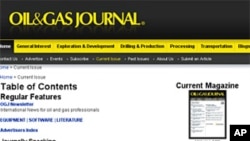The plan to build an Islamic Center and mosque two blocks from the former site of the World Trade Center in New York City has drawn widespread opposition and, as a result, many Muslims feel they are being unfairly blamed for the actions of the terrorists who brought down the two skyscrapers on September 11, 2001. They have an ally in the editor of a widely read energy industry publication who says strident rhetoric produced by the controversy is un-American and harmful to US interests in the Muslim world.
The Oil and Gas Journal is not the magazine where one would normally find debate about such an issue as the proposed mosque in New York City. It is a trade publication that often weighs in on energy issues or the recent BP oil spill in the Gulf of Mexico. But, in the latest issue, Editor Bob Tippee says people in the energy industry should be concerned about the rancorous dispute in New York.
In an editorial titled The Mosque and Oil, Tippee says The oil and gas industry has strong interests in the ugly controversy. He goes on to condemn politicians who he says have appeared xenophobic and mean-spirited as well as those who continually support expensive and, in his view, ill-advised plans to achieve energy independence.
In a VOA interview, Tippee criticizes politicians who tout energy independence by claiming foreign oil exporters are enemies.
"There are antagonistic regimes in the oil exporting community and I name two of them, Venezuela and Iran, but the other exporters are, One, solid business partners and, Two, not any more antagonistic than any other trading partners," said Bob Tippee. "We have our differences with all trading partners. The fact is, in the modern oil market, the exporters need the importers as much as the reverse."
Part of the problem stems from Saudi Arabia's role in the 1973 oil embargo and the involvement of some Saudi citizens in the September 11 attacks. Bob Tippee says many Americans who want to reduce oil imports use the same rhetoric as those who oppose the New York mosque, portraying Arabs and Muslims in general in a negative light.
"I do really think that when a lot of people pick up that line of argument they are thinking 19 attackers, what was it, 15 of which were from Saudi Arabia and Saudi Arabia is the biggest producer and, therefore, Saudi Arabia is against us and that does not hold water [is not true]," he said. "But a lot of people believe that or want to believe that."
Tippee's editorial has not stirred much comment yet from people in the energy sector, but some who have read it agree with the notion that anti-Muslim prejudice, in the case of the mosque and on the issue of oil imports, should be resisted.
Amy Myers Jaffe of the Energy Forum at Rice University's Baker Institute for Public Policy says she agrees with Tippee's defense of oil-producing nations like Saudi Arabia. What Americans should know, says Jaffe, is that Saudi Arabia has often worked closely with the United States to the benefit of the world at large.
"In the aftermath of September 11, so that there would be no panic in the markets and because they had been our ally for 30 years, Saudi Arabia actually increased its oil production to make sure that the September 11 event did not cause an unstable oil market," said Amy Myers Jaffe. "They did not advertise it, but they did it."
But Jaffe does not believe the Oil and Gas Journal editorial will have much impact on the mosque debate or the issue of whether or not the United States should be dependent on foreign energy producers. But she says the sometimes strident rhetoric is unlikely to have any significant impact on US relations with oil-producing countries in the Middle East.
"It would only have an impact if it was our official government position," said Jaffe. "Do we sit around and make our policies based on what some nutcase [insane person] says on Al-Jazeera TV? No. Are they going to make their policies based on what some nutcase says on XYZ TV station in the United States? No."
While Jaffee steers clear of making any judgment on where the mosque should or should not be built in New York, she concurs with Tippee's editorial view that Americans should not blame Arabs or Muslims in general for what a few terrorists did. She says she has seen ugly instances of anti-Muslim behavior.
In the weeks following the September, 2001 attacks, she had to make special arrangements to transport the oil minister of a Middle Eastern nation from the Houston airport to an energy conference at Rice University so as to avoid any confrontation with angry people. She says the debate over the mosque will continue because people upset by the plan have a right to express their opinion. What she says is not in dispute, however, is the official US government position that backers of the mosque have a right to build it.








